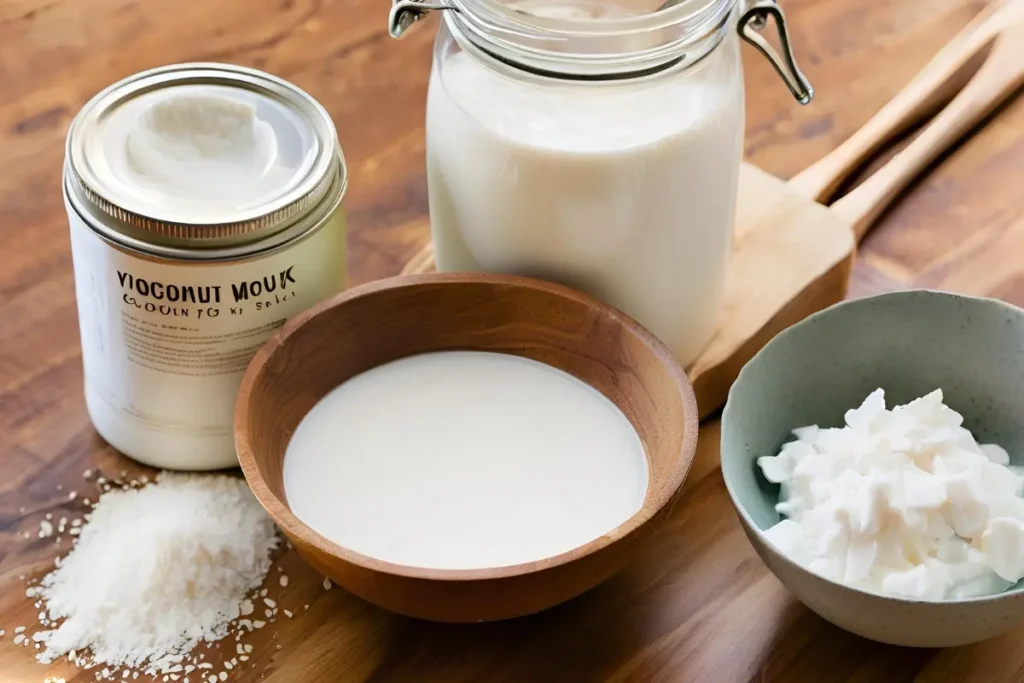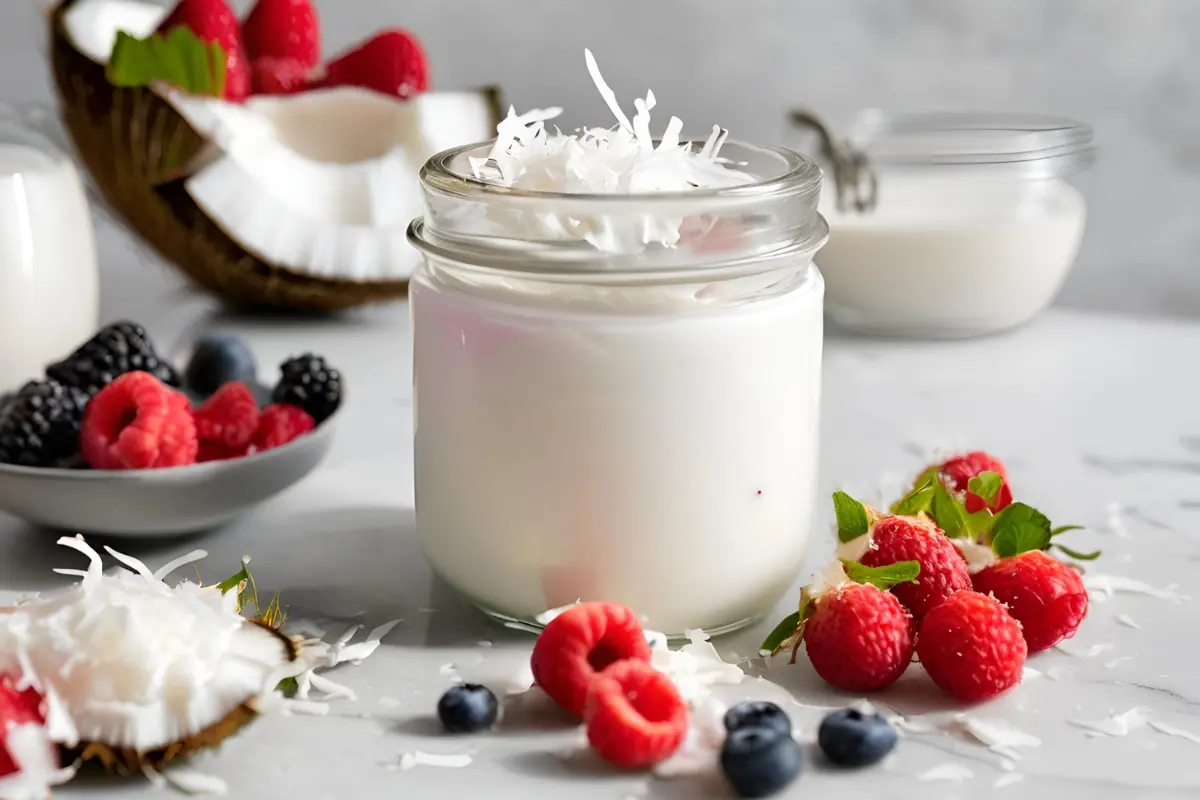Coconut yogurt has gone from a niche health food to a fridge staple in homes everywhere—and it’s easy to see why. Creamy, tangy, and completely dairy-free, it offers a tropical twist on a classic while packing in gut-friendly probiotics. I still remember my first spoonful: a swirl of rich coconut milk with just enough tang to make my breakfast feel like dessert. Whether you’re vegan, lactose-intolerant, or just looking for a new way to boost your meals, coconut yogurt is as versatile as it is delicious. In this guide, we’ll explore what it is, why it’s good for you, and how to enjoy it in endless ways.
Introduction to Coconut Yogurt
What Is Coconut Yogurt?
Coconut yogurt is a plant-based yogurt made by fermenting coconut milk with probiotic cultures. The process mimics traditional dairy yogurt production, resulting in a tangy, creamy product that is entirely dairy-free. This yogurt often includes thickeners, sweeteners, or flavors to enhance its taste and texture, though plain, unsweetened versions are also widely available.
Its tropical flavor, derived from the natural richness of coconut milk, sets it apart from other plant-based yogurts like almond or soy.
A Rising Trend in Dairy-Free Alternatives
As plant-based diets grow in popularity, coconut yogurt has become a key player in the non-dairy market. Many consumers are drawn to it not only for dietary reasons but also for its health benefits and sustainability. According to recent industry data, the plant-based yogurt sector is projected to grow by over 20% annually, with coconut yogurt leading the charge due to its rich texture and unique flavor.
Importance of Coconut Yogurt
Meeting the Demand for Plant-Based and Vegan Options
The rise in veganism and plant-based diets has created a need for innovative dairy alternatives. Coconut yogurt meets this demand perfectly, offering a product that satisfies dietary restrictions without compromising taste or nutritional benefits. It caters to consumers who avoid animal products for ethical, environmental, or health-related reasons.
Moreover, its versatility makes it an excellent addition to sweet and savory dishes alike, further increasing its appeal.
The Health Benefits of Coconut Yogurt
Coconut yogurt offers several health advantages:
- Rich in Probiotics: Live cultures support gut health and digestion.
- Free of Dairy Allergens: Suitable for those with lactose intolerance or dairy allergies.
- Source of MCTs: Medium-chain triglycerides provide quick energy and may support metabolism.
- Low in Cholesterol: As a plant-based product, it’s naturally free of cholesterol.
These factors make it a popular choice among individuals looking to improve their diet while avoiding traditional dairy products.
Who Should Care About Coconut Yogurt?
Vegans and Lactose-Intolerant Individua
Coconut yogurt is a perfect solution for vegans and those who cannot tolerate lactose. In addition, it offers the creaminess and tanginess of traditional yogurt without relying on animal-derived ingredients. Moreover, for individuals who experience digestive discomfort with dairy, this plant-based alternative is truly a game-changer. As a result, it has become increasingly popular among health-conscious consumers.
This version improves flow and readability while incorporating a variety of transition words.
Health-Conscious and Allergy-Sensitive Consumers
Beyond vegans and those with lactose intolerance, coconut yogurt appeals to a broad audience of health-conscious consumers. Its clean ingredient profile and potential gut-health benefits make it attractive to people seeking functional foods. Additionally, many coconut yogurts are free from common allergens like gluten and nuts, making them suitable for individuals with dietary sensit
The Process of Making Coconut Yogurt
Understanding how coconut yogurt is made gives insight into its unique properties, nutritional benefits, and the care required to produce this plant-based alternative. Whether homemade or store-bought, the process involves combining simple ingredients and allowing fermentation to take place under controlled conditions.
Ingredients Required for Coconut Yogur

The Role of Coconut Milk
Coconut milk forms the foundation of coconut yogurt. Made from the grated flesh of coconuts, it is rich in natural fats and provides the creamy texture associated with this yogurt. Full-fat coconut milk is typically used for its ability to create a thick and smooth consistency, though low-fat versions are also an option for lighter varieties.
Why Coconut Milk is Key:
- Provides essential fats for creaminess.
- Contributes to the yogurt’s mild, tropical flavor.
- Serves as a lactose-free base, making it suitable for dairy-free diets.
Probiotic Cultures and Their Importance
Probiotics are live bacterial cultures added to the coconut milk to initiate fermentation. These microorganisms break down natural sugars, producing the tangy flavor that defines yogurt. Additionally, probiotics offer gut-health benefits by supporting a balanced microbiome.
Common strains used in coconut yogurt include:
- Lactobacillus acidophilus
- Bifidobacterium bifidum
- Streptococcus thermophilus
Health Benefits of Probiotics:
- Improved digestion.
- Enhanced immune function.
- Reduced bloating and gut discomfort.
Sweeteners and Flavor Additives
While plain coconut yogurt has a naturally tangy taste, many commercial varieties include sweeteners or flavoring agents. These additions cater to diverse consumer preferences but can increase sugar content.
Common Additives:
- Natural Sweeteners: Honey, agave, or stevia for a healthier option.
- Flavors: Vanilla, fruit purées, or chocolate for variety.
Opt for unsweetened varieties to enjoy the yogurt’s natural flavor while keeping sugar intake in check.
Step-by-Step Process of Making Coconut Yogurt
Preparing the Coconut Milk Base
Start by selecting a high-quality coconut milk. Ensure it is free from additives or thickeners that may interfere with fermentation. For homemade recipes, full-fat coconut milk is preferred to achieve a rich texture.
Steps to Prepare the Base:
- Heat the coconut milk gently to eliminate potential contaminants.
- Cool to a temperature that supports probiotic activity (around 110°F or 43°C).
Adding Probiotic Cultures
Once the coconut milk base is prepared, introduce the probiotic cultures. This is a crucial step, as these live microorganisms are responsible for the fermentation process.
Key Tips:
- Stir the probiotics evenly to ensure consistent fermentation.
- Use a clean, sterile container to prevent contamination.
Fermentation: Time, Temperature, and Conditions
The coconut milk mixture is left to ferment in a warm environment for 8–12 hours. Specifically, the length of fermentation directly affects the yogurt’s tanginess and probiotic concentration. Consequently, maintaining the right conditions is crucial for achieving the desired results.
Optimal Conditions for Fermentation:
- Temperature: Ideally, keep the mixture between 100°F and 110°F to ensure optimal bacterial activity.
- Environment: Additionally, use a yogurt maker or warm oven to maintain consistency throughout the process.
This version includes transition words to clarify relationships between ideas and improve the overall flow.
Storing and Enjoying Your Yogurt
After fermentation, transfer the yogurt to the refrigerator to stop the process and enhance its flavor. The yogurt can be stored for up to 7–10 days.
Ways to Enjoy:
- As a breakfast base with granola and fruit.
- Mixed into smoothies for a creamy texture.
- Incorporated into savory dishes like curries and dressings.
Is Coconut Yogurt Processed?
Comparing Homemade vs. Commercial Coconut Yogurt
Homemade coconut yogurt is often less processed than its commercial counterparts. It typically contains minimal ingredients and avoids preservatives or artificial thickeners.
Commercial varieties, however, may include stabilizers or sweeteners to improve shelf life and flavor. Reading labels carefully helps ensure you choose minimally processed options.
Understanding Minimal vs. Highly Processed Produ
Not all coconut yogurts are created equal. In fact, minimally processed yogurts often contain straightforward ingredients such as coconut milk, probiotics, and natural thickeners. On the other hand, highly processed options may include:
- Added sugars.
- Artificial flavors.
- Synthetic preservatives.
Therefore, opting for products with fewer ingredients ensures a healthier and more natural choice.
This revision incorporates transition words to emphasize contrasts and cause-effect relationships for better flow.
Nutritional Profile
Macronutrients: Fat, Protein, and Carbohydrates
Coconut yogurt’s macronutrient profile is influenced by its coconut milk base:
- Fat: High in medium-chain triglycerides (MCTs), which provide quick energy.
- Protein: Lower than dairy yogurt, typically around 1–2 grams per serving unless fortified.
- Carbohydrates: Vary depending on added sweeteners or flavors.
Micronutrients: Vitamins and Minerals
Many coconut yogurts are fortified with key nutrients to enhance their health benefits:
- Calcium: Added to support bone health.
- Vitamin D: Often included to aid calcium absorption.
- Vitamin B12: Important for vegans who may lack this nutrient.
Probiotics and Gut Health Benefits
Probiotics are a defining feature of coconut yogurt, contributing to:
- Digestive health: By maintaining a balanced gut microbiome.
- Immune support: Probiotics may help strengthen the body’s defenses.
- Reduced bloating: Beneficial for those sensitive to traditional dairy.
Common Misconceptions
Does Coconut Yogurt Taste Like Coconut?
While is made from coconut milk, its flavor is often subtle and tangy due to the fermentation process. Flavored varieties, like vanilla or berry, mask the coconut taste almost entirely.
Is Always Healthier Than Dairy Yogurt
Not necessarily. While coconut yogurt is lactose-free and suitable for plant-based diets, it is often lower in protein and may contain added sugars. Carefully reading labels helps ensure a balanced choice.
Comparing with Other Alternative
As the market for dairy-free yogurt expands is often compared to other plant-based options like almond, soy, or cashew yogurts. Each has its own nutritional profile, taste, and suitability for specific diets.
Which Is Healthier: Coconut Yogurt or Almond Yogurt?
Differences in Nutritional Values
- Coconut Yogurt: High in fats (especially MCTs), lower in protein, and often fortified with calcium and vitamin D.
- Almond Yogurt: Typically lower in fat and calories but thinner in consistency and less creamy.
Each option serves different dietary goals: coconut yogurt provides healthy fats, while almond yogurt is often lighter and more suitable for those monitoring calorie intake.
Variances in Taste and Texture
Coconut yogurt has a rich, creamy texture and a mild tropical flavor, while almond yogurt tends to be nuttier and thinner. For dishes requiring a thicker consistency, coconut yogurt is usually the preferred choice.
Suitability for Specific Diets
- Coconut Yogurt: Great for keto or high-fat diets due to its MCT content.
- Almond Yogurt: Ideal for low-fat diets or those with allergies.
Choosing between the two depends on personal preferences and dietary restrictions.
Practical Tips for Choosing Coconut Yogurt
How to Read Labels for Quality Ingredients
When buying coconut yogurt, prioritize products with minimal ingredients. Look for:
- Key Ingredients: Coconut milk, live cultures, and natural thickeners like agar-agar.
- Fortifications: Calcium, vitamin D, or vitamin B12 to enhance nutritional value.
- Low Sugar Content: Aim for unsweetened options or those with natural sweeteners.
Organic vs. Conventional
Organic coconut yogurt ensures the use of coconuts grown without synthetic pesticides or fertilizers. While organic options may cost more, they align with sustainable and clean eating values. Conventional products can still be healthy if they contain simple, high-quality ingredients.
Avoiding Additives and Excess Sugars
Many flavored yogurts are loaded with added sugars and artificial preservatives. These additives can reduce the health benefits of coconut yogurt. Choosing plain or lightly sweetened varieties allows for greater control over sugar intake.
Making Your Own Coconut Yogurt at Home
Tools and Equipment Needed
Creating homemade is simple with the right tools:
- A clean glass jar or container for fermentation.
- A thermometer to monitor the temperature of the coconut milk.
- Probiotic capsules or starter cultures to kick-start fermentation.
Troubleshooting Common Issues (e.g., Texture, Taste)
- Runny Yogurt: Use full-fat coconut milk or add natural thickeners like tapioca starch.
- Overly Tangy Flavor: Reduce fermentation time to achieve a milder taste.
- Lack of Consistency: Ensure the probiotic cultures are evenly mixed into the coconut milk.
Homemade yogurt allows for full control over ingredients and flavor, making it a cost-effective and customizable option.
Popular Brands and Products
Spotlight on Cocojune and Its Probiotic Content
Cocojune is a leading brand known for its high probiotic concentration and clean ingredient profile. Its products are organic, dairy-free, and available in a variety of flavors, making it a favorite among health-conscious consumers.
Other Top Brands to Try
- So Delicious: Offers a wide range of flavors, including unsweetened options.
- The Coconut Collaborative: Known for its creamy texture and ethically sourced ingredients.
- GT’s CocoYo: Focuses on raw, probiotic-rich yogurts with a tangy flavor.
These brands cater to different tastes and dietary needs, providing plenty of choices for enthusiasts.
Future Trends and Plant-Based Foods
Innovations in Flavor Profiles and Nutritional Enhancements
The plant-based food market is constantly evolving. Upcoming trends in include:
- Exotic Flavors: Mango, passionfruit, and matcha are becoming more popular.
- Enhanced Nutrition: Brands are exploring ways to add plant-based proteins and omega-3s to their products.
Growing Demand and Market Projections
As more people adopt plant-based diets, the demand for coconut yogurt is expected to rise. Industry projections suggest significant market growth, with increased availability in mainstream grocery stores and specialty health food markets.
Summary and Final Thoughts
Recap of Key Points
- Coconut yogurt is a versatile, dairy-free alternative suitable for vegans, lactose-intolerant individuals, and health-conscious consumers.
- Its health benefits include probiotics, healthy fats, and fortified vitamins and minerals.
- Choosing high-quality options or making your own ensures the best nutritional value.
Why Is a Worthwhile Addition to Your Diet
Coconut yogurt combines taste, nutrition, and dietary versatility, making it an excellent addition to meals. Whether used as a base for breakfast, incorporated into recipes, or enjoyed on its own, it is a delicious way to support a balanced diet.

Homemade Coconut Yogurt
Ingredients
Method
- Shake the cans of coconut milk well, then pour the contents into a clean saucepan (if heating) or directly into a sterilized glass jar if skipping heat.
- Optional: Gently warm the coconut milk to about 110°F (43°C) to eliminate contaminants and help activate probiotics. Do not boil.
- Let the milk cool to 100–110°F (37–43°C) before adding the probiotics.
- Open probiotic capsules and stir contents into the milk. Add sweetener and optional thickener if using. Mix well until smooth.
- Transfer the mixture to a clean glass jar. Cover loosely with a breathable lid or cheesecloth.
- Let ferment in a warm place (100–110°F) for 8–12 hours or until tangy. A yogurt maker, oven with light on, or insulated container can help maintain warmth.
- Once fermented to taste, stir the yogurt and refrigerate for at least 4 hours to thicken further. Store in the fridge for 7–10 days.
Nutrition
Notes
Tried this recipe?
Let us know how it was!Resources and Tools for Learning More
Recipes and Guides
- DIY : A step-by-step guide to making your own at home.
- Recipe Ideas: Breakfast bowls, smoothies, and savory applications.
Research Studies on Probiotics and
- “The Role of Probiotics in Gut Health” – A comprehensive look at how probiotics support digestion and immunity.
- “Coconut Milk and Its Benefits” – Insights into the nutritional properties of coconut milk-based products.
Coconut yogurt is more than just a trend; it’s a nutritious and sustainable option that fits seamlessly into modern lifestyles. Its growing popularity and versatility make it an exciting addition to the world of plant-based foods.
Stay Connected with Feel the Recipes
Love cooking and sharing good food? Let’s stay connected! Clara posts new recipes, helpful tips, and little moments from her kitchen every day to keep you inspired.
Join our growing community of home cooks who believe food is meant to be simple, joyful, and shared around the table.
👉 Facebook: Follow us on Facebook
📌 Pinterest: Explore our boards for endless recipe inspiration
🐦 X (Twitter): @feeltherecipes for quick tips and updates
📸 Instagram: @feeltherecipes for fresh photos and behind-the-scenes peeks
Let’s keep cooking, creating, and sharing. Whether you’re here for classic comfort food or something new to try, we’re just a click away.
